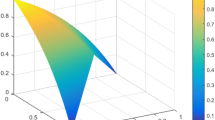Abstract
Based on the concept of fuzzy entropy, two effective measures of intuitionistic fuzzy entropy are proposed in intuitionistic fuzzy information, and then the essential properties of these measures are introduced. These measures are a generalized version of the fuzzy entropy and a complementarity of existing entropy for intuitionistic fuzzy sets. Based on this generalization, a connection between the concepts of the fuzzy entropy and the intuitionistic fuzzy entropy is established. Finally, a numeral example is given to show that the information measures of the proposed intuitionistic fuzzy entropy are reasonable and effective by the comparison of the proposed entropy and existing entropy.
Similar content being viewed by others
References
Atanassov K (1986) Intuitionistic fuzzy sets. Fuzzy Sets Syst 20(1): 87–96
Atanassov K (1999) Intuitionistic fuzzy sets. Physica-Verlag, Heidelberg
Burillo P, Bustince H (1996) Entropy on intuitionistic fuzzy sets and on interval-valued fuzzy sets. Fuzzy Sets Syst 78: 305–316
Bustince H, Burillo P (1996) Vague sets are intuitionistic fuzzy sets. Fuzzy Sets Syst 79: 403–405
De Luca A, Termini S (1972) A definition of non-probabilistic entropy in the setting of fuzzy sets theory. Inf Control 20: 301–312
Gau WL, Buehrer DJ (1993) Vague sets. IEEE Trans Syst Man Cybern 23: 610–614
Kaufmann A (1975) Introduction to the theory of fuzzy subsets, vol. 1: fundamental theoretical elements. Academic Press, New York
Kosko B (1986) Fuzzy entropy and conditioning. Inf Sci 40(2): 165–174
Kosko B (1990) Fuzziness vs. probability. Int J Gen Syst 17(2–3): 211–240
Kosko B (1997) Fuzzy engineering. Prentice-Hall, Englewood Cliffs
Parkash O, Sharma PK, Mahajan R (2008) New measures of weighted fuzzy entropy and their applications for the study of maximum weighted fuzzy entropy principle. Inf Sci 178(11): 2389–2395
Szmidt E, Kacprzyk J (2001) Entropy for intuitionistic fuzzy sets. Fuzzy Sets Syst 118: 467–477
Szmidt E, Kacprzyk J (2006) Entropy and similarity of intuitionistic fuzzy sets. In: 11th International conference, IPMU, Paris, pp 2375–2382
Vlachos IK, Sergiagis GD (2007) Intuitionistic fuzzy information—application to pattern recognition. Pattern Recognit Lett 28: 197–206
Yager RR (1979) On the measure of fuzziness and negation. Part I: Membership in the unit interval. Int J Gen Syst 5: 189–200
Zadeh LA (1965) Fuzzy sets and systems. In: Proceedings of the symposium on systems theory. Polytechnic Institute of Brooklyn, New York, pp 29–37
Zadeh LA (1965) Fuzzy sets. Inf Control 8: 338–353
Zhang QS, Jiang SY (2008) A note on information entropy measures for vague sets. Inf Sci 178: 4184–4191
Author information
Authors and Affiliations
Corresponding author
Additional information
Communicated by S.H. Zak.
Rights and permissions
About this article
Cite this article
Ye, J. Two effective measures of intuitionistic fuzzy entropy. Computing 87, 55–62 (2010). https://doi.org/10.1007/s00607-009-0075-2
Received:
Accepted:
Published:
Issue Date:
DOI: https://doi.org/10.1007/s00607-009-0075-2




